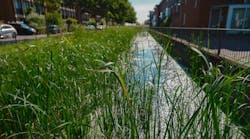Using Constructed Wetlands to Get Rid of Brine
Cities are getting creative in their quests to fund reliable water sources, especially in Western states affected by drought. But sometimes a solution presents a new set of problems. One Arizona city, pumping groundwater to supply drinking water to municipal customers, is finding that it must desalinate the water and remove other impurities like nitrates and metals.
As this article from the Arizona Municipal Water Users Association explains, the city of Goodyear, AZ, has built a reverse osmosis treatment plant to clean the groundwater. The by-product, though, is a concentrated brine that cannot legally be released to a natural waterway because of its high levels of salt and toxins. The city currently produces about 500,000 gallons of brine each day, and increased pumping of groundwater to meet future needs will generate as much as a million gallons a day.
“Right now,” the article notes, “Goodyear mixes concentrated brine with wastewater from homes and businesses and cleans it at Goodyear’s wastewater reclamation treatment plant. The cleaned wastewater is then stored underground. The addition of concentrated brine makes cleaning wastewater a difficult and expensive process.” However, the city has undertaken a pilot project that will use constructed wetlands, with salt-hungry grasses and aquatic plants, to treat the concentrated brine. “The end product still would be salty water but with acceptable concentrations of metals and nitrates. It could be released into the environment after it was blended with other water to reduce its salinity.”
The effort is now in a two-year feasibility study, but the city hopes to begin construction within five years.
About the Author
Janice Kaspersen
Janice Kaspersen is the former editor of Erosion Control and Stormwater magazines.

